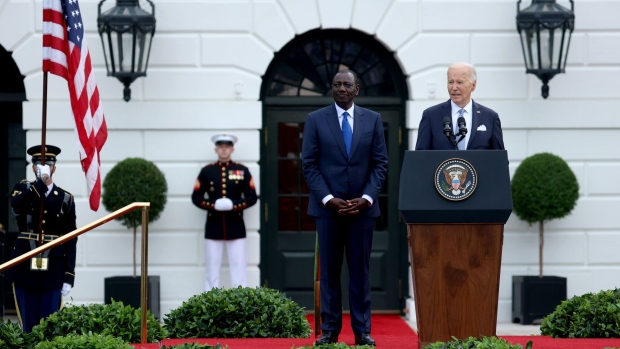Jun 28, 2024
Billionaire Ex-EBay CEO Meg Whitman Is Behind Biden’s Kenya Bet
, Bloomberg News

(Bloomberg) -- A month after Joe Biden treated William Ruto to the first state dinner for an African leader in a decade-and-a-half, the Kenyan president waged a brutal crackdown on largely peaceful anti-tax protesters that left almost two dozen people dead.
The chaos on the streets of Nairobi this week highlights the risky bet the Biden administration has made on the Kenyan leader, orchestrated largely by US Ambassador Meg Whitman, the billionaire former chief executive officer of Hewlett Packard Enterprise Co. and eBay Inc. who’s become a close Ruto adviser and his most important conduit to the international business community. Their ties have garnered criticism from former diplomats as well as opposition politicians.
“It’s not just perceived influence — it’s real influence,” said Eugene Wamalwa, a former minister who leads the opposition Democratic Action Party. “She’s a choirmaster in terms of praise for the Ruto regime.”
Ruto’s state visit to Washington came as the US seeks to build influence in Africa and counter new partnerships being established on the continent with Russia and China — which dominates the African mining industry — but also with middle powers including Turkey, the United Arab Emirates and Saudi Arabia.
‘Common Interests’
The Biden administration praised Whitman and her hands-on approach to her role as ambassador.
“President Biden nominated Ambassador Whitman to serve in Kenya not only because of her valuable experience as a business and technology leader, but also because of her commitment to democratic values,” a State Department spokesman said in a statement. “Her relationships with President Ruto, with other Kenyan government officials, Kenyans in the private sector and with civil society leaders in Kenya are built on our common interests including democracy, human rights, economic opportunity that reaches all people and shared security.”
Ruto is an unlikely ally for the US, which has long portrayed itself as an advocate for human rights: Twelve years ago, he was charged by the International Criminal Court in relation to 2007 election violence. The case was dismissed in 2016, and since his election two years ago, he’s positioned himself as an enthusiastic Western ally focused on economic development and the continent’s most prominent green champion.
“This is an awkward moment for the US given the degree to which they have embraced Ruto,” Murithi Mutiga, program director for Africa at International Crisis Group, said by phone on Wednesday just after Ruto withdrew the contentious tax hikes that had prompted the protests. “They will be relieved that he has backed down, reducing the risk of continued security crackdowns that would have cast an even harsher light on the partnership.”
Rare Relationship
Whitman’s relationship with Ruto is unusual among US ambassadors. Last year, the pair toured Silicon Valley in California, hoping to build bridges to Kenya’s own startup scene, known as the Silicon Savannah. When Ruto visited Atlanta to meet the Black business community there ahead of the state visit, Whitman was at his side.
“Even when the US hosts other governments, the ambassadors don’t come to the front,” said Martha Karua, the chief opposition coalition party’s deputy presidential candidate in the 2022 election. “She was overly conspicuous — she was the lead of the Kenya delegation. We ought to be embarrassed.”
But Nelson Koech, chair of the National Assembly’s defense, intelligence and foreign relations committee, and a ruling party member, said Whitman was strengthening the countries’ ties.
“We celebrate the US ambassador for playing her diplomatic role to ensure that the relationship is deepened and widened according with our shared values,” he said.
Whitman, 67, has said that she’s advocating for Kenya and Africa, not its current government. But her approach has raised eyebrows among some former envoys.
American diplomats should “develop close relationships with the governments to which they are accredited,” said J. Peter Pham, a distinguished fellow at the Atlantic Council who served as US special envoy to the Sahel under former President Donald Trump. But “we need them to remember that they are the representatives of the US government and people to those authorities, and not the latter’s advocates to America, much less partisan cheerleaders of foreign leaders in front of their own people.”
The US Embassy in Nairobi didn’t respond to a request for comment. In an interview on Citizen TV Kenya last month, Whitman said it was “not true” that she’d taken sides in the 2022 election, as the opposition has long alleged.
“Many people, including myself feel like this was a fair and transparent election — I’ve gotten some criticism for saying that, as you recall — but then he’s the president and we want to work with him,” said Whitman.
A native New Yorker, Whitman ran unsuccessfully for California governor in 2010 as a moderate Republican, but backed Democrats Hillary Clinton and Biden for president.
Whitman has dedicated her time in Kenya largely to pitching businesses on why they should invest in Kenya — and the continent more broadly — arranging roadshows for the president and visits by US companies.
There have been few major investments since then beyond a $1 billion data center that Microsoft Corp. and the United Arab Emirates’ G42 Group plan to build. But her efforts to build closer business ties have earned her plaudits.
“It is great that Ambassador Whitman has focused on promoting Kenya-US commercial relations,” said Ken Opalo, associate professor at the School of Foreign Service at Georgetown University. But she’s hampered by both a Kenyan government that “seems more focused on the legitimacy the closer relationship confers on the current administration” and a Washington where “Africa policy in general remains a backwater of strategic thinking.”
--With assistance from Simon Marks, Iain Marlow and Nick Wadhams.
©2024 Bloomberg L.P.





